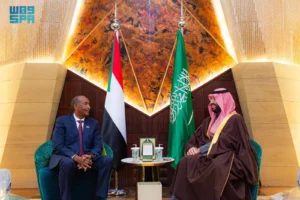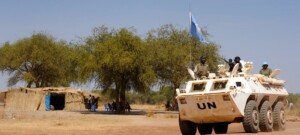US ambassador to UN criticise Security Council over silence on Darfur
On Wednesday, Samantha Power, ambassador of US Mission to the UN urges the Council to make public its report on the role of gold and natural resources in the Darfur conflict, on the day the mandate of the UN Panel of Experts on the Sudan was extended by the UN Security Council (UNSC) for another year.
On Wednesday, Samantha Power, ambassador of US Mission to the UN urges the Council to make public its report on the role of gold and natural resources in the Darfur conflict, on the day the mandate of the UN Panel of Experts on the Sudan was extended by the UN Security Council (UNSC) for another year.
The resolution adopted on Wednesday is an extension of UNSC Resolution 1591 in 2005, that placed a travel ban and asset freeze on those “impeding the peace process” in Darfur, and established a UN panel of experts to monitor the arms embargo on Darfur.
The UNSC’s decision however did not take into account the recommendations by the USA and the UK to add sanctions on individuals and entities that impose illegal taxes on traditional gold miners, as well as on those engaged in the illegal exploitation of gold.
After the passing of the resolution, Rice issued the text of the speech, which she addressed to the president of the UNSC, which follows below:
“Following a brief period of relative calm, the past few weeks have been marked by aerial bombardments and ground offensives carried out by the Government of Sudan in Jebel Mara. The United Nations has reported tens of thousands of civilians displaced and dire humanitarian conditions. Yet, the Security Council has been silent.
We have had a sanctions regime in place for 12 years – and yet we have not been able to muster consensus on a single designation since 2006.
We’ve had an arms embargo in place for 11 years, and year after year we receive report after report of arms flowing, illegally, into Darfur.
We have created a Panel of Experts to provide this kind of reporting. And, yet, when they do, a member of this Council blocks the report from being published because its findings are so disturbing.
“We’ve had an arms embargo in place for 11 years, and year after year we receive report after report of arms flowing, illegally, into Darfur.”
Today’s resolution is a technical roll over, not because the Panel of Experts did not provide findings on how to respond better to the situation. Indeed, this Panel has provided a critical flow of information on the implementation of sanctions in Darfur. Its report provided information that could have better informed our decision-making. For example, this report catalogued numerous violations of the sanctions regime, underscoring the need for greater enforcement by all Member States. It also took note of recurring violations of humanitarian and human rights law.
Yes, today’s resolution is a technical roll over because this Council could not agree on even modest attempts to address in this resolution this information on worrying developments in the Darfur region.
We are particularly concerned that the Council was unable to address the role of illicit trafficking in natural resources in fuelling conflict. The nexus between gold trafficking and armed groups – as outlined by the Panel of Experts – is very well known. This Council has addressed, without controversy, the role of gold and natural resources in other conflicts, such as the Central African Republic, the Democratic Republic of Congo, and even terrorism by ISIL. Today, the Council should have built upon the excellent international and regional initiatives under way in this field to tackle this problem in the Sudan context.
But because of the Panel’s reporting on this issue, a Panel’s report may never become public. And that is extremely concerning. We urge this Council, and those who value the integrity and transparency of the work of the Security Council and its committees, to allow for this report to be published as soon as possible. Some of the same Council members who speak in certain contexts of the need for transparency in sanctions regimes in theory – including in a forthcoming meeting of this Council – now seek to block publication of information related to a real sanctions regime in practice because they do not like its findings. We cannot make judgements about what should be transparent and what shouldn’t be on the basis of whether the information is convenient or inconvenient.
Today, the Council should have built upon the excellent international and regional initiatives under way in this field to tackle the role of gold and natural resources in conflicts in the Sudan context.
Finally, please let me reiterate that as pen holder of this annual renewal, we take seriously our responsibility to consider the Panel’s findings and recommendations, and also the views of all of the members of this Council. Some of those views could not be reconciled with the facts, including the facts presented in the Panel of Experts report that is being blocked from publication. We look forward to continuing our discussion with colleagues on how best to increase transparency, reinforce compliance with Security Council resolutions, and respond to the findings of the Panel. Truly addressing the issues facing Darfur will require this Council to speak with one voice and to take meaningful steps to help advance peace. I thank you, Mr President.”
Listen back to Power's speech from minute 4.35
Rectification 12-02-2016 (17:15): Initially this article mentioned that the statement came from the Panel of Experts. This has been corrected.











 and then
and then